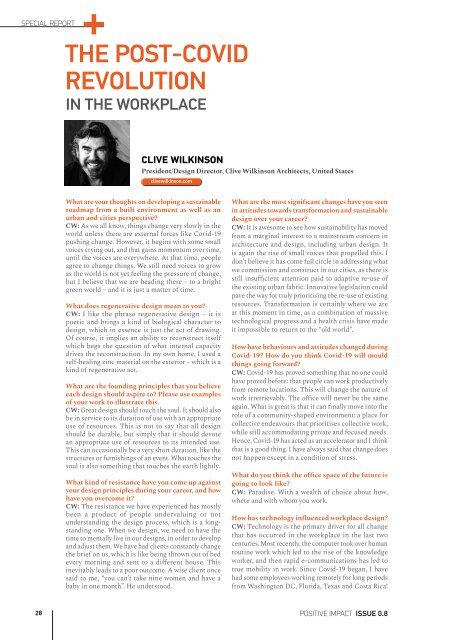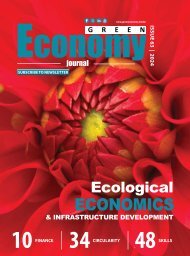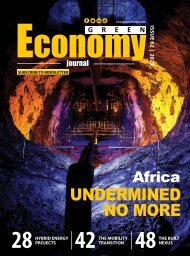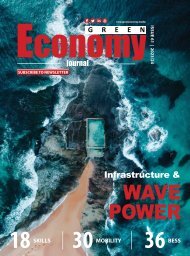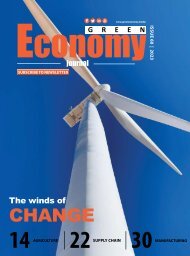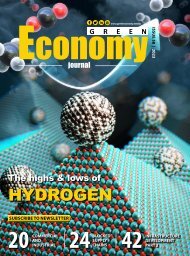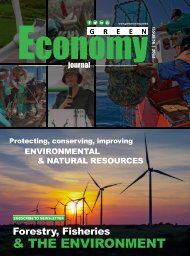POSITIVE IMPACT ISSUE 0.8
Create successful ePaper yourself
Turn your PDF publications into a flip-book with our unique Google optimized e-Paper software.
SPECIAL REPORT<br />
THE POST-COVID<br />
REVOLUTION<br />
IN THE WORKPLACE<br />
CLIVE WILKINSON<br />
President/Design Director, Clive Wilkinson Architects, United States<br />
RESPONSIBLE<br />
INVESTMENT:<br />
ENSURING A SUSTAINABLE<br />
AND RESILIENT FUTURE<br />
SPECIAL REPORT<br />
What are your thoughts on developing a sustainable<br />
roadmap from a built environment as well as an<br />
urban and cities perspective?<br />
CW: As we all know, things change very slowly in the<br />
world unless there are external forces like Covid-19<br />
pushing change. However, it begins with some small<br />
voices crying out, and that gains momentum over time,<br />
until the voices are everywhere. At that time, people<br />
agree to change things. We still need voices to grow<br />
as the world is not yet feeling the pressure of change,<br />
but I believe that we are heading there – to a bright<br />
green world – and it is just a matter of time.<br />
What does regenerative design mean to you?<br />
CW: I like the phrase regenerative design – it is<br />
poetic and brings a kind of biological character to<br />
design, which in essence is just the act of drawing.<br />
Of course, it implies an ability to reconstruct itself<br />
which begs the question of what internal capacity<br />
drives the reconstruction. In my own home, I used a<br />
self-healing zinc material on the exterior – which is a<br />
kind of regenerative act.<br />
What are the founding principles that you believe<br />
each design should aspire to? Please use examples<br />
of your work to illustrate this.<br />
CW: Great design should touch the soul. It should also<br />
be in service to its duration of use with an appropriate<br />
use of resources. This is not to say that all design<br />
should be durable, but simply that it should devote<br />
an appropriate use of resources to its intended use.<br />
This can occasionally be a very short duration, like the<br />
structures or furnishings of an event. What touches the<br />
soul is also something that touches the earth lightly.<br />
What kind of resistance have you come up against<br />
your design principles during your career, and how<br />
have you overcome it?<br />
CW: The resistance we have experienced has mostly<br />
been a product of people undervaluing or not<br />
understanding the design process, which is a longstanding<br />
one. When we design, we need to have the<br />
time to mentally live in our designs, in order to develop<br />
and adjust them. We have had clients constantly change<br />
the brief on us, which is like being thrown out of bed<br />
every morning and sent to a different house. This<br />
inevitably leads to a poor outcome. A wise client once<br />
said to me, “you can’t take nine women and have a<br />
baby in one month”. He understood.<br />
What are the most significant changes have you seen<br />
in attitudes towards transformation and sustainable<br />
design over your career?<br />
CW: It is awesome to see how sustainability has moved<br />
from a marginal interest to a mainstream concern in<br />
architecture and design, including urban design. It<br />
is again the rise of small voices that propelled this. I<br />
don’t believe it has come full circle in addressing what<br />
we commission and construct in our cities, as there is<br />
still insufficient attention paid to adaptive re-use of<br />
the existing urban fabric. Innovative legislation could<br />
pave the way for truly prioritising the re-use of existing<br />
resources. Transformation is certainly where we are<br />
at this moment in time, as a combination of massive<br />
technological progress and a health crisis have made<br />
it impossible to return to the “old world”.<br />
How have behaviours and attitudes changed during<br />
Covid-19? How do you think Covid-19 will mould<br />
things going forward?<br />
CW: Covid-19 has proved something that no one could<br />
have proved before: that people can work productively<br />
from remote locations. This will change the nature of<br />
work irretrievably. The office will never be the same<br />
again. What is great is that it can finally move into the<br />
role of a community-shaped environment: a place for<br />
collective endeavours that prioritises collective work,<br />
while still accommodating private and focused needs.<br />
Hence, Covid-19 has acted as an accelerator and I think<br />
that is a good thing. I have always said that change does<br />
not happen except in a condition of stress.<br />
What do you think the office space of the future is<br />
going to look like?<br />
CW: Paradise. With a wealth of choice about how,<br />
where and with whom you work.<br />
How has technology influenced workplace design?<br />
CW: Technology is the primary driver for all change<br />
that has occurred in the workplace in the last two<br />
centuries. Most recently, the computer took over human<br />
routine work which led to the rise of the knowledge<br />
worker, and then rapid e-communications has led to<br />
true mobility in work. Since Covid-19 began, I have<br />
had some employees working remotely for long periods<br />
from Washington DC, Florida, Texas and Costa Rica!<br />
SHAMEELA SOOBRAMONEY<br />
Chief Sustainability Officer, Johannesburg Stock Exchange (JSE)<br />
What are your thoughts on developing a sustainable<br />
roadmap from a financial investment point of view?<br />
SS: A sustainable roadmap for financial investment<br />
is critically important. When you think about the<br />
adage: “Money makes the world go round”, effectively<br />
we’re talking about allocating capital in the right place<br />
when we're looking at sustainable development from a<br />
financial investment perspective. We need to allocate<br />
capital deliberately in a manner that achieves the most<br />
positive sustainability outcomes. We are referring to<br />
outcomes such as a green economy, decent jobs, and<br />
gender equality as examples. From a simplified peopleplanet-profit<br />
perspective, it’s effectively saying that<br />
businesses can’t survive in a society that is failing.<br />
So a sustainable roadmap, from a financial investment<br />
point of view, fits into a broader notion of responsible<br />
investment and being able to be more responsible<br />
stewards for what we actually spend money on and<br />
invest in, and the impact that has on the environment<br />
and society.<br />
What significant changes have you observed in the<br />
markets in relation to sustainability during your<br />
time at the JSE?<br />
SS: There’s certainly been a tangible uptick in<br />
both awareness and the allocation of capital to<br />
responsible investment and responsible investment<br />
aims. Correspondingly, there has been an increase in<br />
both the requirement for, and the interest in, credible<br />
institutions who can perform an external verification<br />
function – which is what the GBCSA does. This<br />
function brings credibility into the space and helps<br />
to mitigate the risk of greenwashing.<br />
From a simplified people-planetprofit<br />
perspective, it’s effectively<br />
saying that businesses can’t survive<br />
in a society that is failing.<br />
I have also seen an uptick in general societal<br />
awareness of sustainability-related matters – a<br />
growing acceptance that sustainability thinking is<br />
part of good governance – and increasing engagement<br />
by the investment community about bringing those<br />
considerations into investments.<br />
What opposition have you come up against<br />
responsible investing ideas, during your time<br />
working at the JSE?<br />
SS: In terms of sustainability, the past 15 years have seen<br />
a lot of changes in people’s thought processes. Some<br />
main oppositions have been that to be sustainable,<br />
you need to sacrifice return, and that there is always<br />
a significant upfront investment that doesn’t have an<br />
immediate monetary benefit. Another opposition is<br />
that there haven’t been regulations.<br />
I have seen a common overarching narrative in<br />
sustainability that says: “If it’s not regulated, or there's<br />
no law or policy about it, then why should we do it?<br />
If it was important enough, there would be a law or a<br />
policy about it”. In the meanwhile, the shift to a more<br />
conscious capitalism is happening and in fact, there is<br />
mounting evidence that ESG funds and indices have<br />
been outperforming traditional market benchmarks.<br />
Using cost as the argument without real proper backing<br />
is something that is changing.<br />
Why should we care about climate change when<br />
considering investing?<br />
SS: The issues related to climate change are systemic in<br />
nature and have serious economic consequences. There<br />
is massive human impact in relation to exacerbating<br />
the challenges that we already have around poverty<br />
and inequality. The reality is that some of the world’s<br />
most vulnerable will be the worst hit by the impacts of<br />
climate change. Largely because their ability to adapt<br />
to those changes is almost non-existent.<br />
When we consider that how we steward our money<br />
could either exacerbate or help mitigate some of the<br />
potential issues, then investing responsibly becomes<br />
more and more relevant. Investing in mitigation is<br />
showing to be more cost effective than having to bear<br />
the cost of the negative impacts of climate change in<br />
28 <strong>POSITIVE</strong> <strong>IMPACT</strong> <strong>ISSUE</strong> <strong>0.8</strong><br />
<strong>POSITIVE</strong> <strong>IMPACT</strong> <strong>ISSUE</strong> <strong>0.8</strong><br />
29


